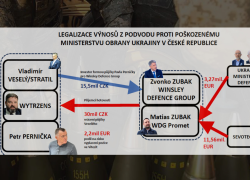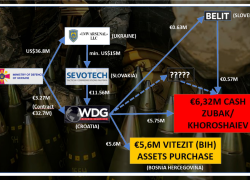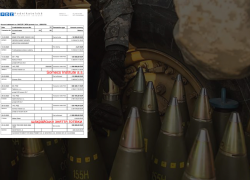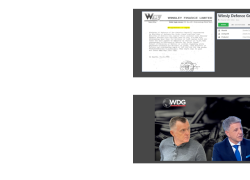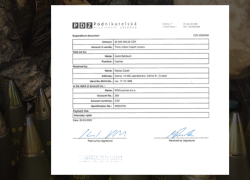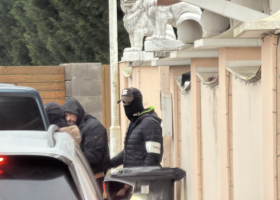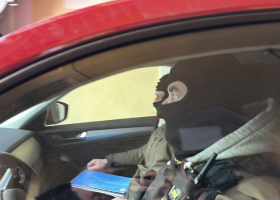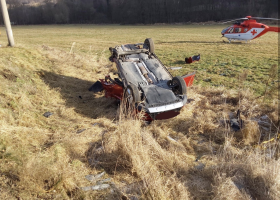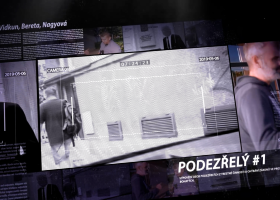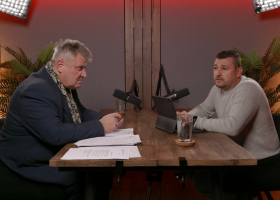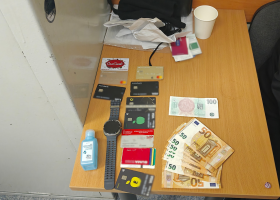-
"Scams Straight Out of the Nineties" - Episode Seven - The Last Tango in Sarajevo
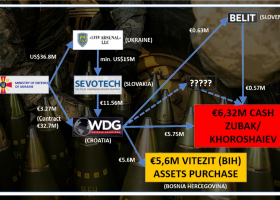
© AKTU.cz Prague 16.11.2023
Our editorial team began unraveling a colossal fraud, at the end of which stolen money from the Ukrainian Ministry of Defense ended up partly in the hands of a Czech and Croatian arms trader.
Video report by Jiří Forman
Since our editorial team couldn’t verify some of the information, we teamed up with Croatian investigative journalist Marin Vlahovič to form an international team.International media outlets are starting to notice the whole case. One of them even accused Czech Prime Minister Petr Fiala of having a personal role in the plundering of the Ukrainian ministry.
So, who did the Ukrainian Ministry of Defense pay an advance for ammunition that was never delivered?
It was paid to the Croatian company WDG Promet, which belongs to Matias Zubak, the son of the well-known Croatian arms dealer Zvonko Zubak.
At the turn of 2022-2023, his company received over ten million euros in advances for ammunition for mortars and tanks. The transactions were carried out through several subcontractor companies.
However, the company delivered nothing and never returned the money. When the Ukrainian Ministry of Defense began pressing for either the delivery of goods or the return of funds, the Zubak family started publicizing various excuses and blaming other individuals, such as Czech Prime Minister Petr Fiala. From the start, these accusations struck our editorial team as completely absurd.
Not only we but also foreign journalists have been following this case for over a year. There has never been any proven participation by either the Czech Prime Minister or the Czech government. Instead, we discovered another “Czech connection.”
WDG Promet routed the funds from the transaction into an account at the Czech Podnikatelská družstevní záložna. The bank itself flagged the suspicious transactions because the sums were large and highly unconventional. Moreover, Zubak had promised to provide the necessary documents, a promise he never fulfilled, as confirmed by PDZ employee Kamil Bahbouh.
Bahbouh further explained that Matias Zubak himself subsequently withdrew the funds in Czech crowns and euros. Before doing so, however, he had the PDZ exchange the money with another client – euros for crowns.
Because the funds were converted at the Czech National Bank’s mid-market rate, there was no profit – merely a straight conversion from euros to crowns. Zubak then withdrew the crowns and even went as far as to accuse Podnikatelská družstevní záložna of embezzlement.
He deliberately disclosed only that he sent out the money and never got it back. He conveniently omitted the fact that the money was immediately sent back in a different currency, which he then withdrew.
He even attempted to challenge the fact that the signature on the cash receipt wasn’t his, a claim refuted by the opinion of an expert from the forensic institute of the Czech Police.
Had any Czech banking institution stolen money from a client’s account, it would have been investigated and sanctioned by the Czech National Bank. Yet there is no record of such a penalty or investigation on the ČNB’s website. This clearly shows that the accusation of embezzlement by the PDZ is just another lie by the Zubak family.
So why did Zubak withdraw the money in the Czech Republic and in crowns when he had no Czech business partner there?
For clarity, the flow of money is illustrated in the graph. As mentioned earlier, part of the overall transaction was conducted by WDG Promet through subcontractor companies, namely the Ukrainian LVIV Arsenal LLC and the Slovak firm SEVOTECH. It was through these two entities that a portion of the funds left Ukraine. About 37 million dollars reached the Ukrainian LVIV Arsenal LLC, which then sent 15 million dollars to the Slovak SEVOTECH – a company that, incidentally, was on the verge of being taken over by Ukrainian Khoroshaiev just before receiving the funds. Khoroshaiev has also operated in the Czech Republic, where he was involved in several business ventures to support a war-devastated Ukraine.
From the Slovak SEVOTECH, nearly 12 million dollars were transferred to the Croatian company WDG Promet. Additional millions of euros were sent directly by the Ukrainian Ministry of Defense to WDG Promet’s account. But the money vanished, and the ammunition was never delivered.
Both the Slovak SEVOTECH and the Ukrainian LVIV Arsenal, along with other companies (for example, one in Slovenia), created an opaque structure of contracts and payments.
Ukrainian intelligence services are investigating the entire matter, even on Czech territory, albeit currently without the consent of Czech authorities. This means their investigation is not subject to any oversight.
The investigation is also being conducted by the NCOZ.
The case also implicates Petr Pernička, an unconvicted Czech businessman associated with death, whose insolvency we reported in one of our previous installments.
WDG Promet used part of the funds advanced by the Ukrainian Ministry of Defense to purchase the premises of the bankrupt company Vitezit, located about 70 km from Sarajevo.
In the past, both Zubak and Pernička—who describes Zubak as a long-time business partner—vied for that property.
Pernička even transferred part of his assets to Zubak at a time when he himself was under investigation, supposedly as a share for delivering the Russian S-300 anti-aircraft system in Croatia. At the same time, Petr Pernička also transferred part of his assets to his brother Pavel Pernička.
There is no doubt that Pernička tried to raise money for Vitezit through Zubak, even approaching his creditors for a loan.
Ultimately, Vladimír Stratil – Veselý lent the money for the advance payment for Vitezit’s ammunition factory. He did so by securing Pernička’s obligation with shares of the company Ligranit. He lent approximately 15.5 million crowns and received about 31.5 million crowns. In the end, Ligranit remained registered under Stratil’s sister, Sandra Iringová.
Another figure linking Zubak to the Czech underworld is Jiří Wytrzens, a lawyer who was acquainted with Stratil (Veselý). Through him, he also became acquainted with Pernička—whom he represented, among others—and Zubak.
Using the name of the Croatian company WDG Promet, Wytrzens even wrote to our Croatian colleague Marin Vlahovič and threatened him. Recently, Wytrzens appeared alongside Zubak on Croatian television N1, claiming that WDG Promet became a victim of Czech bankers who embezzled funds that Matias Zubak had personally withdrawn. As a lawyer, he knew full well that he was lying, and he refused to comment on the case.
In the end, the Croatian company WDG Promet did acquire Vitezit for more than 5.5 million euros, with payments made on December 7 and December 20.
It is remarkable that one of the major suppliers to the Ukrainian Ministry of Defense turned out to be a newly established company without prior experience – WDG Promet. It is likely that everything is related to former Deputy Defense Minister Liyev, who was briefly dismissed in January 2023 over this affair. It appears that this scandal also contributed to the dismissal of Ukrainian Defense Minister Reznikov, which took place this September.
And here we come back to the question: Why did Zubak need to withdraw the money in cash and in crowns? One possibility is that it was disbursed to Czech members of the WDG Promet team – Veselý, Pernička, and Wytrzens. Another possibility is that these funds financed pro-Russian activities in the Czech Republic. It is not out of the question that such a sophisticated fraud is the work of Russian intelligence services. The former deputy of the Ukrainian Ministry of Defense, Liyev, who enabled the whole transaction, held a Belarusian passport.
For all parties involved, this may well amount to money laundering.
More installments:


